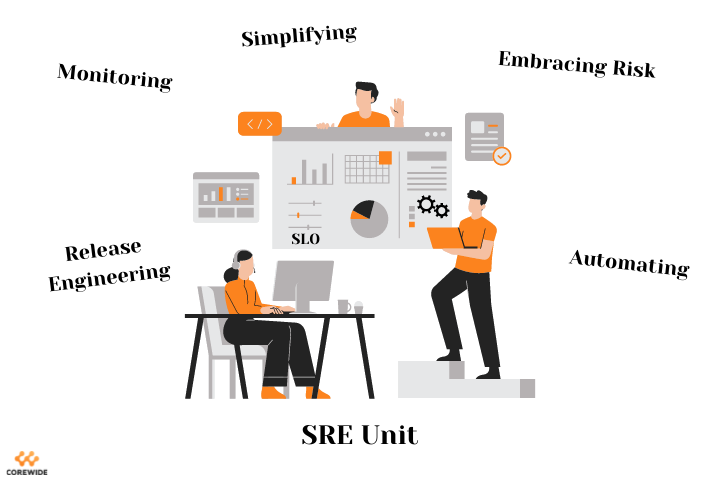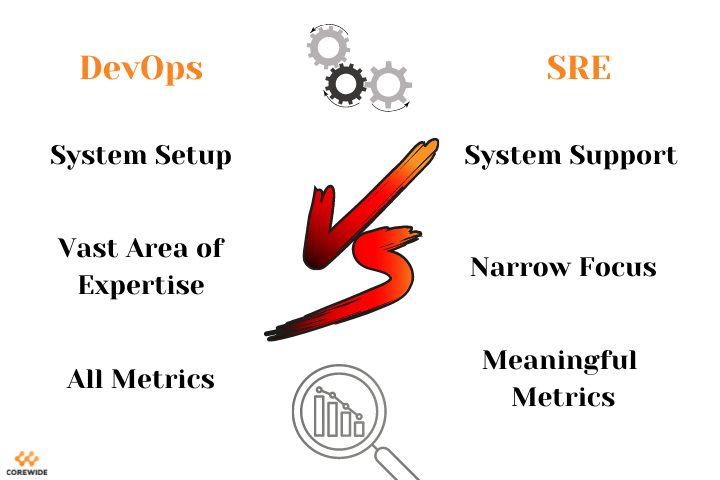DevOps 2.0: the SRE Practices

Organizations always appeal to DevOps as a panacea to get hardware and software running like clockwork and never failing. But the thing is that DevOps only provides recommendations on improvements – the SRE encompasses their implementation.
The Three Letters
The term comes from Google and stands for site reliability engineering. The principal value of the concept is encrypted in its title – making things work reliably.
SRE is a priceless practice for creating scalable and highly reliable software systems. It’s about managing massive infrastructure through code (which is more sustainable for system admins who deal with hundreds of machines).
The concept uses DevOps-related tools and practices to ensure excellent system management, fast problem solving, and operational efficiency.
Embracing service-level agreements (SLAs), SRE defines the required reliability of the system through service-level indicators (SLIs) and service-level objectives (SLOs).
The SLO is based on the SLI – organizations set SLOs to the point where unreliability causes customer pain. The SLO should be monitorable to give maximum efficiency.
The SRE concept likewise refers to tech support and reflects its inner side: engineers work with indirect business needs to deliver outstanding client experience. Involving SRE teams in traditional IT support allows companies to run it in a DevOps way – our previous article describes the idea in detail.
Let’s get back to site reliability engineering. The purpose is clear – but who is responsible for realization?
Deployment Engineers are the ones to cover site reliability, being responsible for pre-release audits and release schedules. Moreover, an SRE department is in charge of code deployment, configuration, monitoring, availability, emergency response, and capacity management.
In brief, DevOps practices answer what to do and why, while SRE executes these suggestions using a proper tech stack. How about focusing on the ways of implementation?

Best Practices
Since some SRE principles overlap with the DevOps mindset, don’t be surprised when facing automation or monitoring. The following five concepts will help you improve digital operations in multiple areas, be it manufacturing or hospitality.
- Automate
Our team emphasizes that automation is the king among DevOps or SRE practices – organizations use it to free up resources for other business needs. In contrast, teams aim at easing processes and decreasing the amount of repetitive work.
Speaking of automation, it can primarily help you in incident management, testing, and deployment. Delegate server creation or switch between codebases to a machine, configure proper tooling to find bugs instead of humans and automate runbooks to respond to incidents quicker.
Don’t hesitate and reduce human intervention to benefit from effectiveness and higher velocity.
- Simplify
Leonardo da Vinci said, “Simplicity is the ultimate sophistication”, – and we can’t but mention this quote when talking about SRE practices.
SRE highlights simplicity to achieve reliability and refinement, so consider creating plain environments to track and fix bugs or improve them without difficulties.
Suppose you already benefit from any system – check it for the areas of redundant complexity and optimize high toil ones. In that case, such an inspection will also help reduce the amount of repetitive work.
- Venture
Building excellent reliability requires money, time, energy, and risk. Embracing the latter allows companies to manage budgets and resources wisely.
Split improvement areas and set up a budget and a minimum acceptable reliability level for each. Сorrelate the cost of improvements and their impact on client satisfaction.
The book by T.Panaggio, The Risk Advantage, claims that “the unexpected edge for entrepreneurial success starts with identifying a worthy risk and then having the courage to take it.” So act decisively but always weigh potential risks before doing anything.
- Release
Should I point out the necessity of stable and continuous builds and deploys for successful software development?
Modern quality standards comprise configuration management, automated testing, continuous integration, monitoring, and documenting of each stage – the majority of SRE practices, as you can see.
Teams, therefore, need to choose single release standards, build guidelines, set up a monitoring system and automate as much as possible if they want to benefit from site reliability engineering.
- Monitor
And last but not least – notorious monitoring.
Watching metrics and gathering data allows teams to understand the health of the systems and fix bugs before reaching the end-user. And the ideal monitoring system analyses metrics to answer what’s broken and why constantly.
When setting up monitoring, connect alerting tools to monitoring data and scan the entire system for possibly threatful patterns. Choosing proper tooling is key to an effective process establishment.
When selecting a tool, make sure it’s a qualitative one. Consider spikes in metrics (excellent soft watches them in a context) and virtualization (any superb instrument offers this feature).
So, having embraced this vital SRE and DevOps practice, you’ll know for sure whether your system is ready to handle high traffic or your website’s load time.

Summary
DevOps and site reliability both emphasize cross-team communication, shared responsibility, and automation – however, these mindsets are not identical.
DevOps is a broader philosophy applied to multiple technologies, while SRE has a tight focus: the latter is about a unit assigned to a specific project or tech stack. The SRE monitors the metrics valuable exclusively for a given case when DevOps watches all possible parameters.
Let me put it in a nutshell: SRE is the DevOps implementation itself. And at Corewide, we are experts at both.
We offer DevOps services if the demand is to set up an environment. And in case you require to support a ready-made project, our company provides a truly unique solution – an SRE unit in charge of tech support.
The outcome is brilliant since mixing traditional ideas with a DevOps philosophy is our speciality. You can keep reading our articles or contact us and leap towards success – I bet I know what you’ll choose.